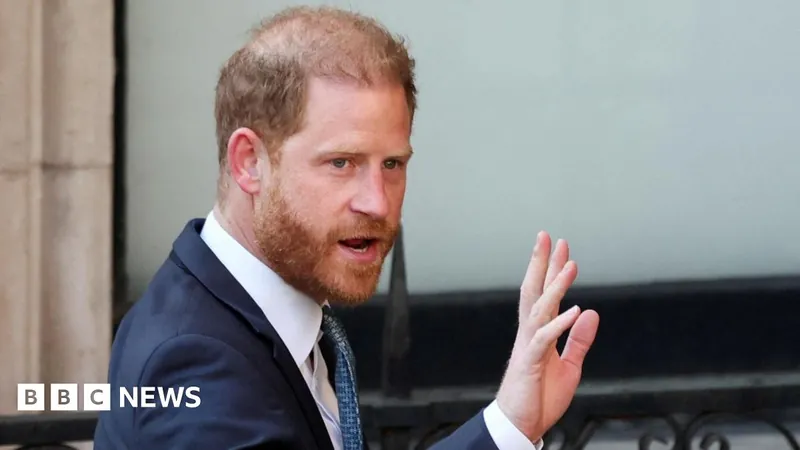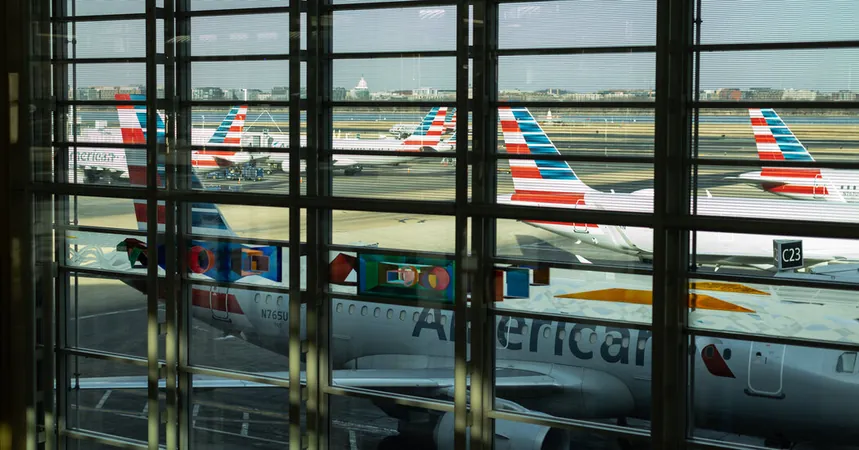
Prince Harry Faces Legal Battle Over Security Arrangements: Is He Being Treated Unfairly?
2025-04-08
Author: Ming
Introduction
In a dramatic continuation of his legal saga, Prince Harry appeared in the Court of Appeal today, challenging a High Court ruling regarding his security arrangements while visiting the UK. The case centers on whether the Royal and VIP Executive Committee (Ravec) justifiably downgraded his protection status after he stepped back from royal duties and relocated to California in 2020.
Court Appearance and Context
Arriving at the court shortly after 9:30 AM BST, the Duke of Sussex took his place at the center of the courtroom, where he has previously expressed deep concerns about the safety of his family, especially for his children, Archie and Lilibet, who he wants to feel at home during visits to the UK.
Arguments in Court
Harry's barrister, Shaheed Fatima KC, argued that the prince has been 'singled out' for inferior treatment in security protocol. She emphasized that Ravec failed to follow established procedures by not consulting experts on the risks associated with Harry's security before making significant changes. In past rulings, the High Court's decision validated Ravec's approach, stating that there was no unlawful conduct in how they handled Harry's security.
The government's representative, Sir James Eadie KC, countered these claims by stating that Prince Harry's protection was not completely revoked; rather, it had been modified to a case-by-case basis due to his new status as a non-working royal. Eadie maintained that the decisions made were sound, explaining that they are based on subjective risk assessments that rely on expert judgment. He added that 'there are no right or wrong answers' in these situations, suggesting a level of complexity in security decisions.
Judges' Deliberations and Concerns
During the court's deliberations, Fatima pointed out alleged flaws in the previous judge's reasoning, particularly regarding the requirement for a risk assessment from Ravec's Risk Management Board (RMB) before altering Harry's security situation. According to her arguments, the lack of this analysis represents a significant oversight, particularly in matters concerning the safety of a public figure.
Conclusions and Broader Implications
As the proceedings unfolded, the judges sought clarity on whether the RMB's assessment was a necessary step in Ravec's decision-making process. The discussions drew attention to the nuances of royal security protocols, highlighting how previous decisions regarding Harry’s protection may have set a problematic precedent.
As the court session adjourned for the day, it was announced that proceedings would resume tomorrow morning. While many details related to the security measures discussed remain classified for safety reasons, the case continues to raise important questions about how former working royals are protected compared to their active counterparts.
Prince Harry’s legal contention stems from his and Meghan Markle's decision to step back from royal duties in January 2020, fueled by their frustrations over media intrusion and the desire for financial independence. Though they reside in California now, Harry’s legal battles bring him back to the UK, where he remains a prince and retains the titles of Duke and Duchess of Sussex. The couple's two children are now recognized as Prince Archie and Princess Lilibet of Sussex, yet Harry feels deprived of the same level of security afforded to other royals.
As this high-stakes legal dispute unfolds, it prompts a broader conversation about the ongoing tension between personal privacy, royal responsibilities, and the protective measures of the state—an issue that will continue to capture public attention as the court proceedings progress. Will Prince Harry's fight lead to changes in how security is afforded to former royals? The world will be watching closely as this case develops.




 Brasil (PT)
Brasil (PT)
 Canada (EN)
Canada (EN)
 Chile (ES)
Chile (ES)
 Česko (CS)
Česko (CS)
 대한민국 (KO)
대한민국 (KO)
 España (ES)
España (ES)
 France (FR)
France (FR)
 Hong Kong (EN)
Hong Kong (EN)
 Italia (IT)
Italia (IT)
 日本 (JA)
日本 (JA)
 Magyarország (HU)
Magyarország (HU)
 Norge (NO)
Norge (NO)
 Polska (PL)
Polska (PL)
 Schweiz (DE)
Schweiz (DE)
 Singapore (EN)
Singapore (EN)
 Sverige (SV)
Sverige (SV)
 Suomi (FI)
Suomi (FI)
 Türkiye (TR)
Türkiye (TR)
 الإمارات العربية المتحدة (AR)
الإمارات العربية المتحدة (AR)